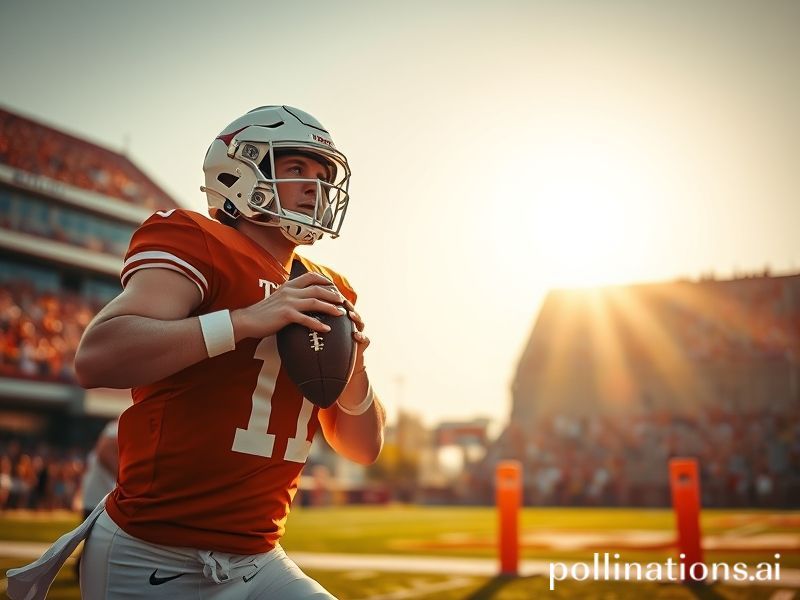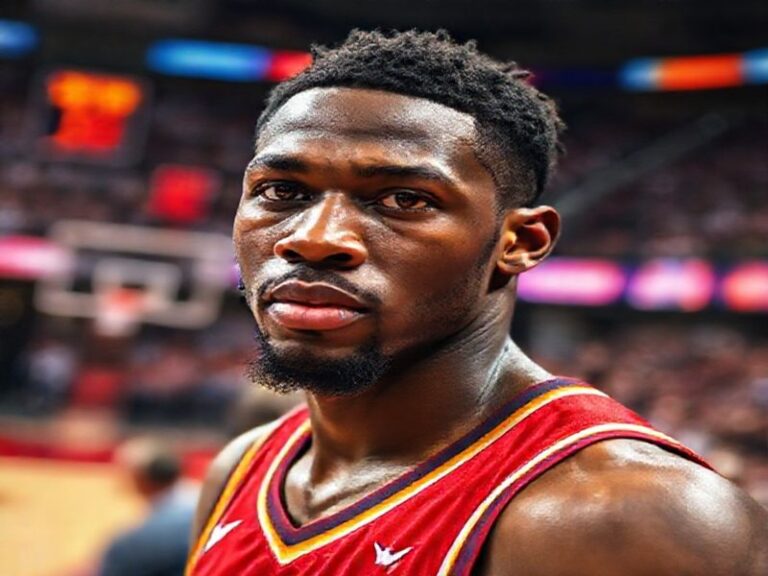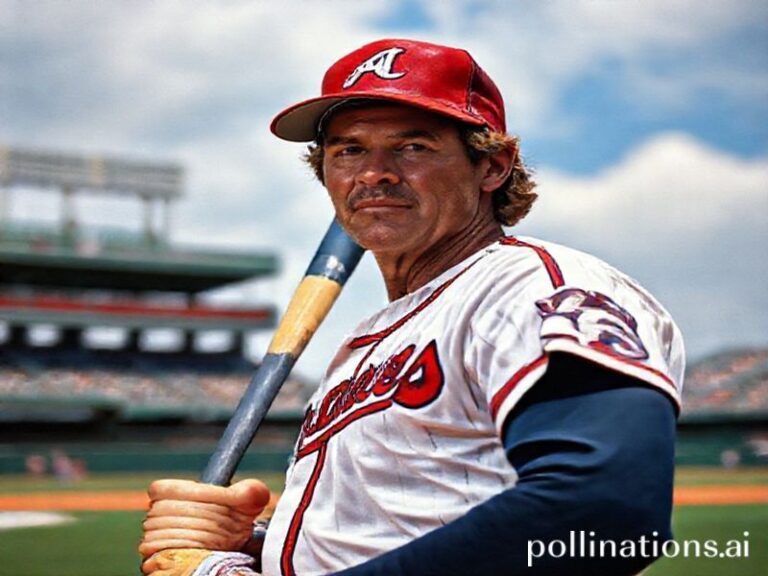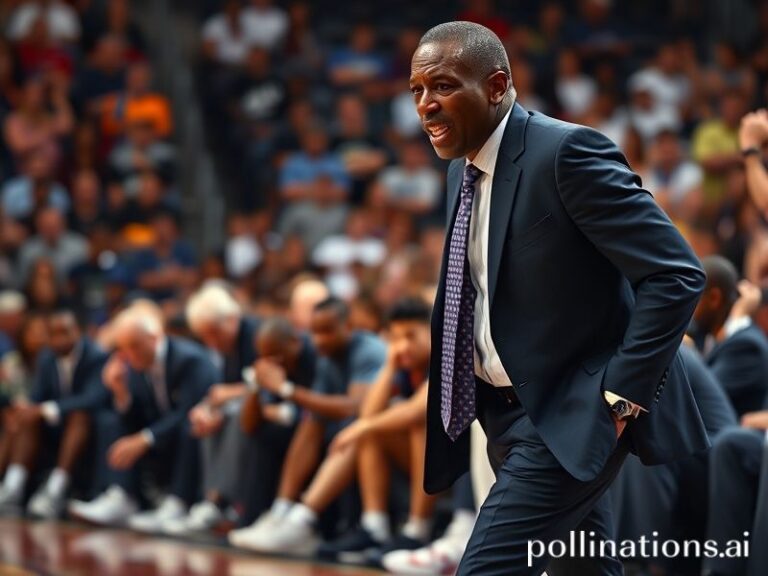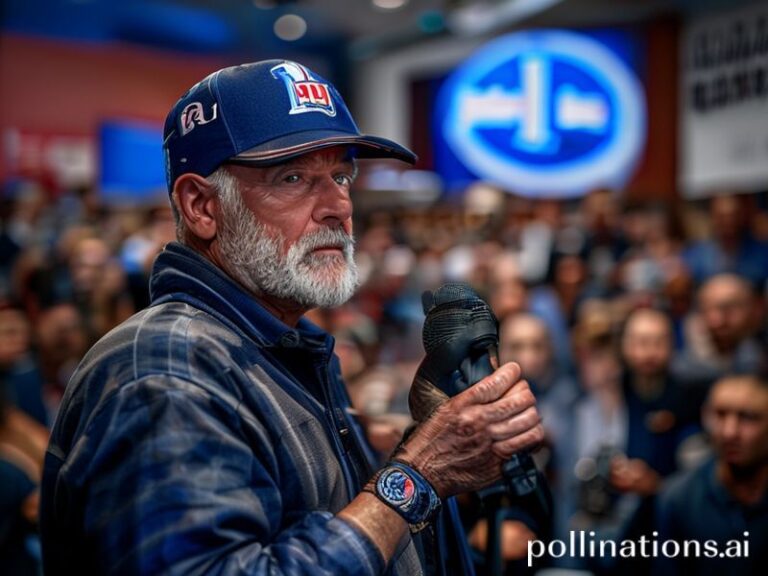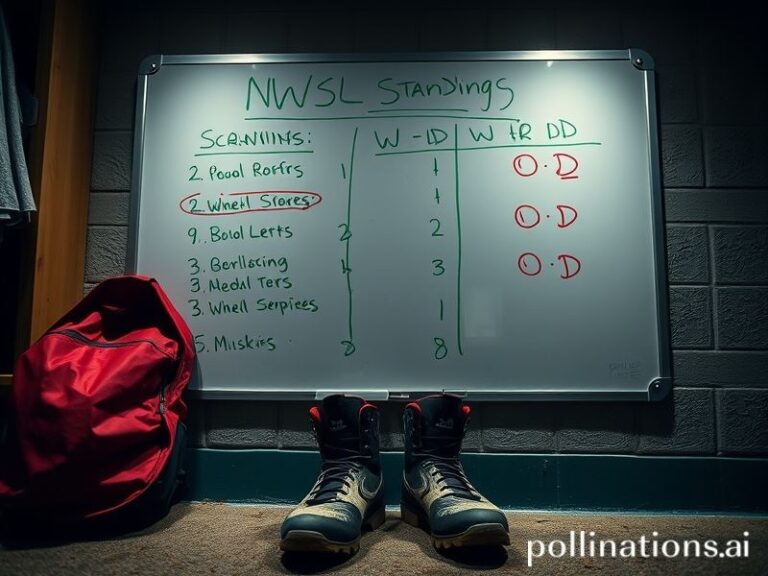Quinn Ewers: The Unpaid Quarterback Steering Global Supply Chains and NATO Morale
Quinn Ewers, Quarterback, Accidental Geopolitical Pawn
By the time the sun rises in Austin, it has already set on some other nation’s patience. In that daily rotation of hope and disappointment, a 20-year-old Texan with a haircut that cost more than the GDP of Tuvalu has become the latest proof that the world’s most powerful empire still measures its virility in 40-yard-dash times.
Ewers, for the uninitiated, is the University of Texas quarterback whose right arm has been declared a matter of national—some would say supranational—interest. When he flings a spiral into the end zone against Alabama, satellites reposition themselves so that U.S. troops in Ramstein can watch on a 50-millisecond delay. When he throws an interception, crypto markets in Singapore hiccup on the assumption that American confidence is wobbling. Somewhere in Brussels, a NATO analyst updates a slide titled “Soft Power: Pigskin Variant” and wonders whether the alliance needs a playbook for fourth-and-long diplomacy.
To grasp the absurd grandeur of it all, consider the supply chain. Nike stitches his No. 3 jersey in Ho Chi Minh City sweatshops, ships it through the Suez Canal (traffic jam permitting), and lands it at the Port of Los Angeles where longshoremen—who themselves dream of college tuition for their kids—offload the sacred cotton armor. From there, FedEx ferries the jerseys to suburban malls where teenagers in Ohio pay 160 dollars to cosplay a Texan they’ve never met. Globalization, once heralded as the end of history, now ends in a stadium parking lot with a lukewarm michelada and a Discover card.
Meanwhile, Chinese state media—never missing a chance to gloat—runs explainers on how the Longhorns’ reliance on the air raid offense is evidence of American moral decay: all flash, no discipline. Russian troll farms push memes suggesting Ewers is a deep-state psyop designed to distract from inflation numbers. (The memes are in Cyrillic, but the sarcasm translates perfectly.) In short, an unpaid college athlete has become the Rorschach test for whatever ideology needs projecting that week.
Europe, bless its aging heart, watches with the same bemused horror reserved for deep-fried butter at state fairs. Le Monde publishes a 3,000-word essay comparing Ewers to Joan of Arc, if Joan had a NIL deal worth seven figures and a TikTok hype house. German sports talk shows struggle to pronounce “Sarkisian” but gamely trace the concept of redshirt seasons to medieval guild apprenticeships. The continent that invented both the Enlightenment and the 0-0 draw cannot fathom why a society that refuses paid parental leave will happily guarantee a teenager’s family a lakeside McMansion as long as he can throw a leather prolate spheroid past cornerbacks.
Down under, Australians shrug. Their own rugby lads bash skulls without helmets for beer money and a handshake, so they file Ewers under “American excess” and go back to worrying about coral bleaching. Yet even they tune in when ESPN cuts to the Cotton Bowl, because nothing transcends culture quite like the spectacle of unpaid labor generating billions while coaches get private jets. It’s the same reason Romans kept going to the Colosseum even after the empire started outsourcing the legions: the fall is more fun when you have a seat.
Back in the United States, boosters speak of Ewers in messianic tones usually reserved for tech IPOs or vaccine rollouts. His 6-foot-2 frame has been weighed, measured, and found sufficient to atone for sins ranging from the 2008 financial crisis to the last season of “Game of Thrones.” If he wins a national title, the stock price of Whataburger will presumably ascend to the Sistine Chapel ceiling. If he doesn’t, well, there’s always the transfer portal—sporting neoliberalism’s answer to LinkedIn.
Conclusion
In the end, Quinn Ewers is less a person than a mirror: the world stares into his visor and sees whatever it needs to believe about itself. We assign him the duty of reconciling our contradictions—amateurism versus profit, nationalism versus global supply chains, hope versus the inevitable ACL tear. That’s a heavy load for shoulders still filling out, but the show must go on. Somewhere tonight a cargo ship steams eastward, stuffed with tomorrow’s jerseys. History, like a rogue linebacker, is blitzing from the blind side. And the kid under center? He’s just trying to hit the open man before the pocket—and the planet—collapses around him.

